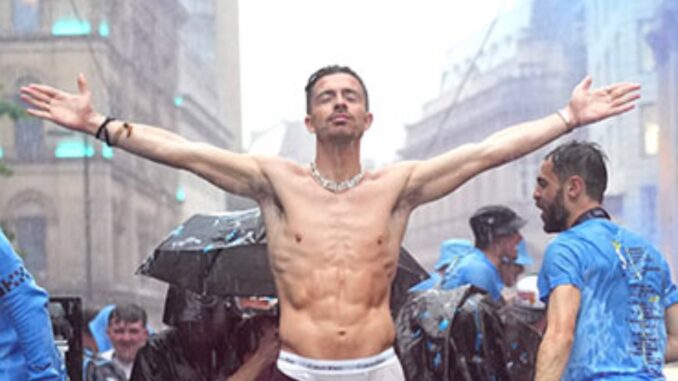
The glare of camera flashes, the insistent clicks of shutters, the shouted questions cutting through the night air – these are the familiar trappings of life in the public eye, a life Jack Grealish knows all too well. Just days after his Manchester City side suffered a setback, the spotlight found him once again, this time outside a London nightclub. The scene that unfolded, captured on video and circulated widely, painted a picture of a man clearly “worse for wear,” a man whose patience had seemingly reached its breaking point.
Grealish, a footballer renowned for his skill on the pitch and his flamboyant personality off it, emerged from the popular nightspot and was immediately met by a throng of photographers. The video footage shows him engaging in a tense exchange with the paparazzi, his frustration palpable. He challenged their actions, questioning the very purpose of their relentless pursuit. “Sorry do you actually feel better for doing what no seriously,” he was heard to say, his voice laced with a mixture of exasperation and genuine curiosity. The question hung in the air, a stark reflection of the often-uneasy relationship between celebrities and the media.
The interaction didn’t end there. A comment from a bystander seemed to further ignite Grealish’s frustration. “What did you say?” he retorted, his tone sharp. It was at this point that a friend intervened, stepping in to seemingly de-escalate the situation. The friend, visible in the video, gently restrained Grealish, attempting to guide him away from the growing crowd and diffuse the tension. Their presence served as a buffer, a reminder of the human being behind the celebrity persona.
Despite his friend’s efforts, Grealish remained visibly agitated. His body language spoke volumes, conveying a mix of anger, frustration, and perhaps even a sense of helplessness. He eventually retreated into his chauffeur-driven car, but the incident left an air of unease, a stark reminder of the pressures faced by those living in the public eye.
This encounter isn’t an isolated incident. Grealish’s high-profile status, coupled with his often-celebrated lifestyle, makes him a prime target for paparazzi. Their relentless pursuit of photographs and stories is a constant presence in his life, a shadow that often encroaches on his personal space. He has previously voiced his concerns about the intrusive nature of this attention, highlighting the challenges of navigating life under constant scrutiny.
The incident raises complex questions about the delicate balance between freedom of the press and the fundamental right to privacy. While photographers undoubtedly have a role to play in informing the public, their methods can sometimes cross the line, becoming invasive and even harassing. The line between public interest and personal intrusion is often blurred, and the consequences can be significant for those on the receiving end.
Grealish’s recent outburst underscores the immense pressures faced by professional athletes. They are not just performers on the field; they are public figures whose lives are often dissected and scrutinized. Every move they make, both on and off the pitch, is subject to intense analysis and commentary. This constant pressure can take a significant toll, contributing to stress, anxiety, and even outbursts of anger.
The incident also serves as a reminder of the importance of empathy and understanding when it comes to public figures. While they may enjoy a life of privilege and glamour, they are, at the end of the day, human beings with emotions and vulnerabilities. They deserve a degree of respect and privacy, just like anyone else. The relentless pursuit of a photograph or a story should not come at the expense of their dignity and well-being.
As Grealish’s car pulled away from the nightclub, the incident served as a microcosm of the challenges faced by those living in the public eye. The spotlight, while capable of bringing fame and fortune, also casts a long shadow, one that often encroaches on personal boundaries and exposes individuals to relentless scrutiny. It is a reminder that even those who appear to have it all are not immune to the pressures and frustrations of life in the public eye. The incident serves as a call for a more nuanced understanding of the relationship between celebrities and the media, a relationship that must be grounded in respect, empathy, and a recognition of the fundamental right to privacy.
Leave a Reply